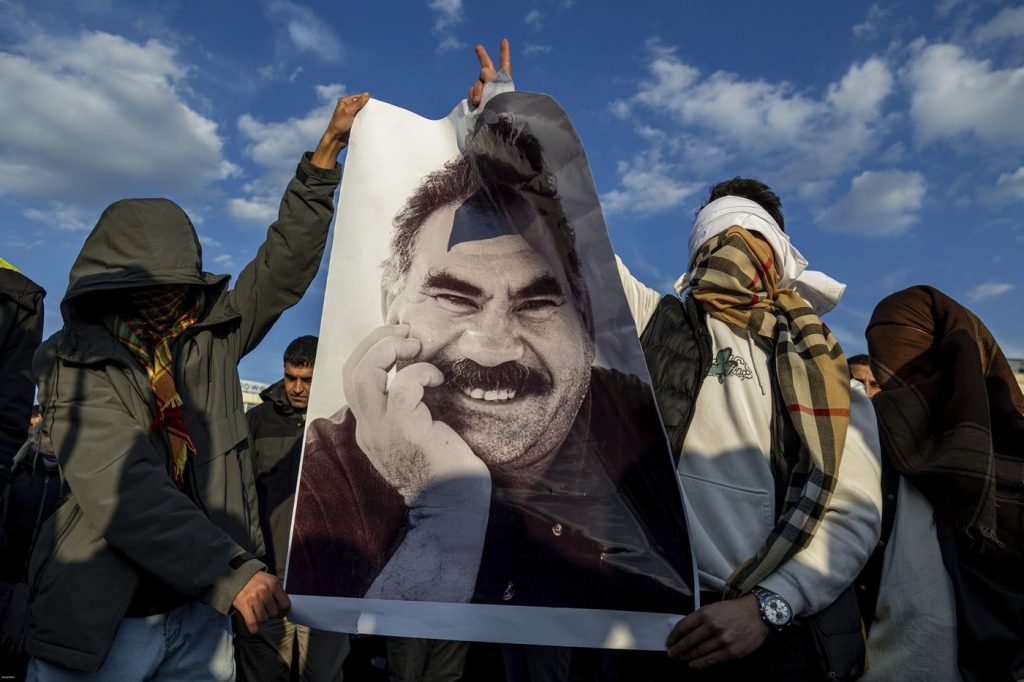ISTANBUL (AP) — Kurdish militants, who have been involved in a 40-year insurgency in Turkey, announced a ceasefire on Saturday. This development is seen as a potential significant advantage for President Recep Tayyip Erdogan's government, coming just two days after their imprisoned leader, Abdullah Ocalan, called for the group to disarm.
The declaration from the Kurdistan Workers Party (PKK) was released through the Firat News Agency, which is aligned with the group. Ocalan has been in Turkish prison since 1999, and the statement emphasized his influence by referring to him as "Leader Apo." The PKK stated, “We declare a ceasefire effective today to pave the way for the implementation of Leader Apo’s Call for Peace and Democratic Society. None of our forces will take armed action unless attacked.”
This ceasefire coincides with significant changes in the region, such as power shifts in neighboring Syria after the toppling of President Bashar Assad, the diminishing strength of Hezbollah in Lebanon, and the ongoing Israel-Hamas conflict in Gaza. The announcement marks a rare moment of progress, considering that peace talks between the PKK and the Turkish government collapsed in summer 2015. Since the conflict began in 1984, tens of thousands have died.
The PKK's executive committee indicated that Ocalan's call suggests the onset of a "new historical process in Kurdistan and the Middle East." The term "Kurdistan" encompasses regions in Turkey, Iraq, Syria, and Iran with significant Kurdish populations. The PKK also expressed its commitment to adhere to Ocalan's call but stressed the necessity for favorable democratic and legal conditions to ensure the success of this initiative.
Ocalan's call for disarmament comes amidst increasing pressure on the main pro-Kurdish political party in Turkey, which has seen several of its mayors ousted and replaced by government appointees in recent months. The PKK further appealed for Ocalan's release from the Imrali prison to lead a congress aimed at disbanding the militant group.
The peace initiative initiated by Erdogan’s coalition partner, Devlet Bahceli, a far-right politician, began in October and includes the prospect of parole for Ocalan, contingent upon the PKK renouncing violence. Erdogan characterized Ocalan's message as signaling a "new phase" in peace efforts, suggesting an opportunity to foster unity among Turkish and Kurdish communities. He stated, “There is an opportunity to take a historic step toward tearing down the wall of terror that has stood between (Turkish and Kurdish peoples’) thousand-year-old brotherhood.”
Some analysts speculate that Erdogan’s government is attempting to secure Kurdish backing for a new constitution, which could allow him to extend his rule beyond 2028, the end of his current term. Bahceli has openly advocated for a new constitution, claiming it vital for Turkey's future stability. Reportedly, Erdogan and Bahceli are also seeking parliamentary support from the pro-Kurdish People's Equality and Democracy Party (DEM).
Despite his lengthy imprisonment, Ocalan maintains considerable influence over the Kurdish movement. While the PKK has been led by other figures during his incarceration, many of them operate from the Kurdish region in northern Iraq. In Syria, Kurdish fighters affiliated with the PKK have been engaged in fierce conflicts with Turkish-backed forces; however, the leader of the U.S.-backed, Kurdish-led Syrian Democratic Forces clarified that Ocalan's ceasefire appeal does not pertain to their group. The Turkish government insists that all Kurdish factions associated with the PKK, whether in Turkey, Syria, or Iraq, must disband.
In recent years, the PKK has resorted to isolated attacks inside Turkey due to increased military pressure, including drone support for the Turkish military, which has pushed PKK fighters further into the mountainous regions of Iraq.










